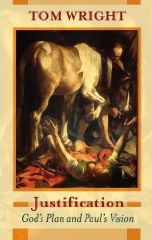 Excerpted from the Institutes of the Christian Religion, Book III, Chapter XV, Section 5, Christ as the Sole Foundation, As Beginner and Perfecter.
Excerpted from the Institutes of the Christian Religion, Book III, Chapter XV, Section 5, Christ as the Sole Foundation, As Beginner and Perfecter.
The below section from Calvin’s Institutes is an excellent summary of the foundation of Gospel-centered sanctification (progressing and maturing in holiness). Any other application of teaching apart from this foundation is basing our progression in the faith, at some level, upon our own working and toiling to “be good” (which is an oxymoron in light of Scripture), as opposed to submitting ourselves to His sovereign working in us of what is already true of us by the declaration of our justification before God’s throne. Living in light of what is already true of us in Christ is itself the motivation unto holiness. As Albert Mohler pointed out in his talk from the Together for the Gospel conference in 2010, “The Reformation was all about the recovery of The Gospel; the means of reforming the church was The Gospel.” This excerpt from Calvin is a perfect summary of what this means.
Only by a constant orientation to the Gospel, in particular that Christ is our righteousness (having none of our own with which to offer God in exchange for the eternal life of our souls), are we going to progress in holiness. Any other teaching is using law as a means unto progression in holiness which results in burnout, deadness, legalism, and oddly enough, legalism itself actually winds up resulting in the worst forms of license. The law was given by God to expose how far we fall short, not an instrument to motivate us unto holiness. It is an instrument whose design is to bring us low, to bring us into humility before God, so that we see how great the love of Christ is in the Gospel, that He Himself fulfilled the law in our place, died our death in our place, and rose again to seal, give life, and confirm all He has accomplished in our place. He is righteousness. Calvin shows us just how great this Gospel is and how it is the only true motivator unto holiness.
“…Christ, when we acknowledge Him, is given us to be our righteousness [1 Cor. 1:30]. He alone is well founded in Christ who has perfect righteousness in himself: since the apostle [Paul] does not say that He was sent to help us attain righteousness but Himself to be our righteousness [1 Cor. 1:30]. Indeed, he states that “He has chosen us in Him” from eternity “before the foundation of the world,” through no merit of our own “but according to the purpose of divine good pleasure” [Eph. 1:4-5, cf. Vg.]; that by His death we are redeemed from condemnation of death and freed from ruin [cf. Col. 1:14, 20]; that we have been adopted unto Him as sons and heirs by our Heavenly Father [cf. Rom. 8:17; Gal. 4:5-7]; that we have been reconciled through His blood [Rom. 5:9-10]; that, given into His protection, we are released from the danger of perishing and falling [John 10:28]; that thus ingrafted into Him [cf. Rom. 11:19] we are already, in a manner, partakers of eternal life, having entered in the Kingdom of God through hope. Yet more: we experience such participation in Him that, although we are still foolish in ourselves, He is our wisdom before God; while we are sinners, He is our righteousness; while we are unclean, He is our purity; while we are weak, while we are unarmed and exposed to Satan, yet ours is that power which has been given Him in heaven and on earth [Matt. 28:18], by which to crush Satan for us and shatter the gates of hell; while we still bear about with us the body of death, He is yet our life. In brief, because all His things are ours and we have all things in Him, in us there is nothing. Upon this foundation, I say, we must be built if we would grow into a holy temple to the Lord [cf. Eph. 2:21].”

 Excerpted from the
Excerpted from the 
 In speaking of N.T. Wright’s new book, Justification: God’s Plan and Paul’s Vision, responding to and critiquing Piper’s defense of justification, entitled, The Future of Justification, itself critiquing Wright’s understanding of justification, McLaren says, “John Piper, it turns out, has done us all a wonderful favor. In writing the critique that invited this response, he has given Bishop Wright the opportunity to clearly, directly, passionately and concisely summarize many of the key themes of his still-in-process yet already historic scholarly and pastoral project. Wright shows–convincingly–how the comprehensive view of Paul, Romans, justification, Jesus, and the Christian life and mission that he has helped articulate embraces ‘both the truths the Reformers were eager to set forth and also the truths which, in their eagerness, they sidelined.’ Eavesdropping on this conversation will help readers who are new to Wright get into the main themes of his work and the important conversation of which it is a part. And it will give Wright’s critics a clearer sense than ever of what they are rejecting when they cling to their cherished old wineskins of conventional thought.” —Brian McLaren, author A Generous Orthodoxy
In speaking of N.T. Wright’s new book, Justification: God’s Plan and Paul’s Vision, responding to and critiquing Piper’s defense of justification, entitled, The Future of Justification, itself critiquing Wright’s understanding of justification, McLaren says, “John Piper, it turns out, has done us all a wonderful favor. In writing the critique that invited this response, he has given Bishop Wright the opportunity to clearly, directly, passionately and concisely summarize many of the key themes of his still-in-process yet already historic scholarly and pastoral project. Wright shows–convincingly–how the comprehensive view of Paul, Romans, justification, Jesus, and the Christian life and mission that he has helped articulate embraces ‘both the truths the Reformers were eager to set forth and also the truths which, in their eagerness, they sidelined.’ Eavesdropping on this conversation will help readers who are new to Wright get into the main themes of his work and the important conversation of which it is a part. And it will give Wright’s critics a clearer sense than ever of what they are rejecting when they cling to their cherished old wineskins of conventional thought.” —Brian McLaren, author A Generous Orthodoxy